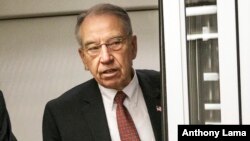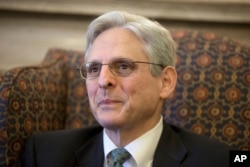A key U.S. senator directly told Supreme Court nominee Merrick Garland on Tuesday the Republican-controlled Senate has no intention of holding hearings on his nomination this year, and will wait for the country's next president to make an appointment to fill a court vacancy.
Senator Charles Grassley of Iowa ate breakfast with Garland, with the lawmaker's office saying they had a "cordial and pleasant" meeting.
But Grassley, chairman of the Senate Judiciary Committee that normally holds hearings on Supreme Court nominees, "explained why the Senate will not be moving forward during this hyper-partisan election year."
President Barack Obama nominated Garland, an appellate court judge in Washington, for the life-time Supreme Court position after the unexpected death in February of Justice Antonin Scalia, a conservative stalwart on the court for nearly 30 years.
The appointment of Garland has heightened the already fractious political divide between Democrats and Republicans in Washington, because he could alter the court's philosophical balance. Scalia was part of a five-member bloc of conservative justices that often held sway over the court's four liberal justices in key rulings.
Garland is widely regarded and viewed as a centrist jurist in his rulings. But analysts are predicting that if he fills the Supreme Court seat, he would prove to be more liberal than Scalia, thus altering the court's ideological makeup that has held for years.
Democrats have called for hearings and a vote on Garland's nomination. But Grassley and most other Republican lawmakers have rebuffed them, holding out hope that a Republican president will be elected in November's national election to replace Obama when he leaves office next January and then would make a Supreme Court appointment more to their liking.
Some Republicans, however, have said they will consider acting on Garland's nomination after the presidential election if the leading Democratic contender, former Secretary of State Hillary Clinton, is elected, on the theory that she might nominate a justice who is even less to their liking than Garland.





